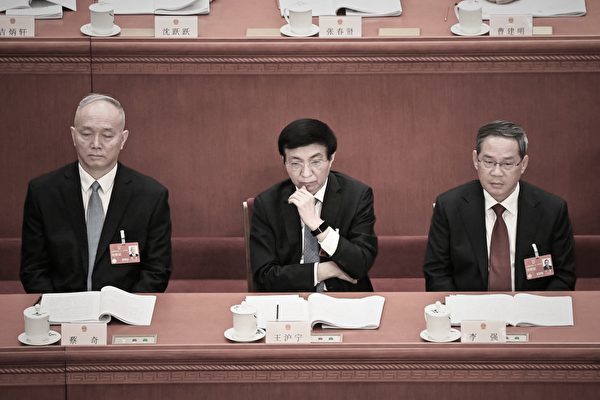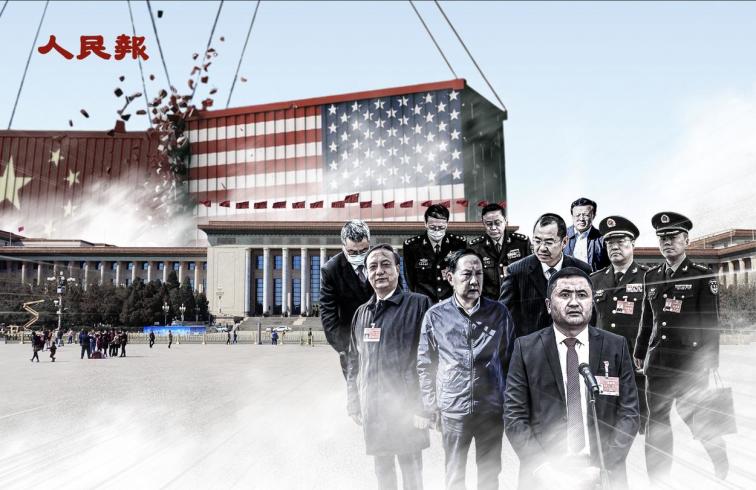On March 7, 2023, (from left to right) Cai Qi, Wang Huning, and Li Qiang at the Chinese Communist Party's National People's Congress. (Greg Baker/AFP via Getty Images)
[People News] According to Chinese Communist Party (CCP) convention, after every major meeting, Party officials from top to bottom must “express their support” and “study” the so-called spirit of the meeting. The Fourth Plenary Session of the 20th Central Committee was no exception. On October 24, four of the Standing Committee members — Li Qiang at the State Council, Zhao Leji at the National People’s Congress (NPC), Wang Huning at the Chinese People’s Political Consultative Conference (CPPCC), and Li Xi at the Central Commission for Discipline Inspection (CCDI) — each convened their respective Party group meetings to study the spirit of the Fourth Plenum. Standing Committee member Ding Xuexiang and Politburo members He Lifeng, Zhang Guoqing, and Liu Guozhong attended the State Council session. In other words, except for Xi Jinping and Cai Qi, all seven Standing Committee members made public statements.
Judging from state-media reports, the four Standing Committee members’ tones were not aligned — especially regarding their attitudes toward Xi.
Li Qiang, in his speech, said that proposals for the “15th Five-Year Plan” were guided by “Xi Thought.” He stressed the need to “earnestly unify thinking and action with the important spirit of Xi Jinping’s speech and the plenary-session arrangements,” ensuring a good start to the “15th Five-Year Plan.” Beyond that, however, Li’s remarks did not further mention Xi (at least according to official media reports), and the formulaic pledges of loyalty such as the “two upholds and two establishes” were absent from his statement.
Turning to Zhao Leji’s remarks — he repeated wording from the communiqué, saying that achievements of the past five years were “the result of unity under the Party Central Committee with Xi Jinping at its core.” He urged all Party groups within the NPC to diligently study Xi’s speeches, reports, and the adopted proposals and communiqués, to “resolutely support all decisions made at the plenary session, and consciously unify thinking and action with the Party Central Committee’s decisions.” Yet when discussing development for the “15th Five-Year Plan” period, Zhao did not mention Xi or “Xi Thought.”
Notably, Zhao Leji was the only Standing Committee member to mention that “the plenary session reviewed and adopted the disciplinary inspection report on serious violations by certain personnel, confirming the Politburo’s earlier decision to expel them from the Party.” He said the NPC “must consciously uphold the Party Central Committee’s centralized and unified leadership,” and that it should “support the ‘two establishes’ through concrete action” and “achieve the ‘two upholds,’” but he did not refer to Xi by name.
Wang Huning — a political theorist who has served three administrations and coined several dubious doctrines — at the CPPCC meeting largely repeated the communiqué’s language. He referred several times to “the Party Central Committee with Xi Jinping at its core,” saying the achievements of the past five years were due to “the leadership of the Central Committee with Xi at the helm” and the guidance of “Xi Thought.” When elaborating on “15th Five-Year Plan” development, he mentioned the “two upholds and two establishes,” but unlike before, he did not bring them up in the opening paragraph.
As for Li Xi, personally elevated by Xi Jinping, he opened his remarks by demanding that disciplinary-inspection and supervisory organs “more firmly support the ‘two establishes,’ resolutely achieve the ‘two upholds,’ and truly unify thinking and action with the Party Central Committee’s decisions.” He mentioned the “two establishes” and “two upholds” again in the second paragraph, calling for “steadfast confidence and determination to follow the General Secretary and advance along the new journey” and to “unswervingly forge ahead along the direction pointed out by General Secretary Xi Jinping.”
Finally, Li Xi referred to “Xi Thought” and Xi’s ideas on “self-revolution,” and he mentioned anti-corruption — but said nothing about the high-ranking military officers and officials aligned with Xi who were disciplined during the Fourth Plenum. Li Xi’s stance shows that he continues to safeguard Xi’s position.
In addition, on October 24, the Party secretaries of Beijing, Tianjin, and Shanghai — Yin Li, Chen Jining, and Chen Min’er — each held meetings to study the spirit of the Fourth Plenum. Their statements generally echoed the communiqué, also mentioning Xi and the “establishing and upholding” formulations. Yet only Yin Li and Chen Min’er explicitly called for “safeguarding the authority and unified leadership of the Party Central Committee.” Chen Jining’s statement was vague, merely emphasizing “adherence to the Party’s overall leadership.” As Xi’s confidant, Chen Jining’s defense of Xi is evident.
From the statements of the four Standing Committee members and three Politburo members, it can be seen that the just-concluded Fourth Plenary Session likely involved considerable disagreement over Xi’s political future. Even those who once swore loyalty to Xi and were seen as his factional allies are now divided — some still cling to him, while others deliberately downplay his role or distance themselves. And Xi seems powerless to stop it. Does this signify that Xi’s political dominance has truly reached its end?
(First published by People News) △










News magazine bootstrap themes!
I like this themes, fast loading and look profesional
Thank you Carlos!
You're welcome!
Please support me with give positive rating!
Yes Sure!